Table of Contents
You Don’t Know What Love Is
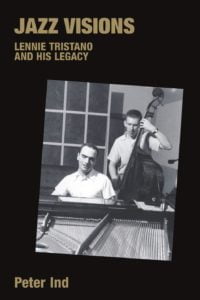
Lennie Tristano – Who was Lennie Tristano, the Jazz Master (1919-1978)?
Lennie Tristano was born in Illinois, Chicago in 1919 “almost blind in the bosom of a family originally from southern Italy, he began his piano studies with his mother, an opera singer and pianist. At the age of ten he enters a school in Chicago where he studies music theory, alto and tenor saxophones, clarinet and violoncello, and at the same time directs the school orchestra”.
According to the text that accompanies the aforementioned album, at this time Lennie Tristano also played trumpet, guitar and drums. He later starts higher music studies and gets a ‘Bachelor of Music’ in just two years. It is after his studies when he begins to be interested in Jazz and musical improvisation in general.
Download the best Jazz Transcriptions and sheet music from our Library.
His influences, apart from classical music (especially Bach), can be summed up with the following names: Art Tatum, Bud Powell, Earl Hines Lester Young and Charlie Parker. In 1943, he combined his career as a musician with teaching, for which he should also be considered an important ‘Jazz Educator’ (Jazz teacher).
Later he even founded his “New School Of Music” in New York. At that time he coincides with Lee Konitz, alto saxophonist, also originally from Chicago, with a unique style that will play a very important role in his future formations. In 1945, he collaborated with the formation of Earl Swope (trombonist) and Woody Herman (clarinetist, band-leader and singer), moving to New York in 1946.
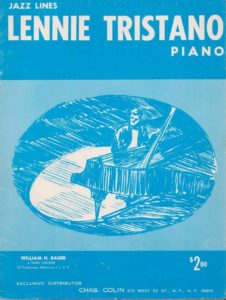
From his circle of students and colleagues an extraordinary sextet crystallized in 1948: Lee Konitz (alto sax), Warne Marsh (tenor sax), Billy Bauer (guitar), Lennie Tristano (piano), Arnold Fishkin/Harold Granowsky (bass) and Denzil Best (drums).
The group worked closely together for a year, something unusual, until recording Crosscurrent for the Capitol label in March and May 1949 in New York.
What is special about Lennie Tristano’s style is a very linear approach to his improvisations. Until now, melodic improvisation in Jazz was mainly based on playing what the harmonic base pre-established (the vertical part of the music). In other words: melodic instruments played piano or guitar chords in the form of successive notes (arpeggios) to create melodic lines.
Tristano tries to give the melodic line itself more importance, so that it could also exist without harmony. His goal is to avoid the repetition of ideas and to improvise ‘for real’ without the use of ‘licks’ (pre-established and pre-rehearsed melodic fragments). Later, on his album “Lennie Tristano” from 1955, he includes two songs in which he practically does not play any chords, only a great melodic line, a particular thing for a pianist, considering that the strong point of the piano tends to be precisely the chords. .
The last consequence, as paradoxical as it may seem, is the complete annulment of the harmonic instrument in some Cool Jazz formations, such as the Gerry Mulligan Quartet with Chet Baker from 52/53, with the formation: sax, bass trumpet and drums.
Apart from the plain melodic line, he experimented with counterpoint, that is, the simultaneous combination of two or more independent melodic voices. He is in fact considered a pioneer in counterpoint improvisation. Another peculiarity was a total independence of melody and compass.
That is to say: he played asymmetrical phrases that did not correspond to the beats, they went beyond the bar line and the structures of the general form of the musical piece, to such an extent that he had difficulty finding a drummer capable of accompanying him adequately.
The latter obviously also exists in Bebop, for example, but not in such an outlined and intentional way.
When it comes to recording his music, he is probably the first Jazz musician to experiment with the possibility of recording by tracks. This is impressively documented in his ’55 Turkish Mambo track, in which he records three melodic lines on top of each other. Each changing independently of measure during the piece. The result is a delirious combination of voices, counterpoints and polyrhythms.
Despite his special interest in melody also his chords and harmonic links were complex and innovative. To all this we must add another novelty that he introduces in his groups, and that is perhaps the most revolutionary.
At the end of their concerts, Lennie Tristano and his musicians would often play a free piece. The only thing that was remembered before performing was the order of entry of the instruments. That same thing, by the way, he also used to do with his students.
He dedicated his entire life to a single goal: to achieve total mastery of his instrument and the music for it. In this way, he wanted to reach a total state of control and freedom at the same time. In this way he wanted to give way to the essence of Jazz: feeling and emotion, the work that all Jazz musicians do deep down. Lennie Tristano, in a conversation with the critic Barry Ulanov points out: “I can never think and play at the same time […]. It’s emotionally impossible. [Adds Ulanov:] Thought is an anticipation of acting. The studio precedes a recording like this week after week, month after month, year after year.”
His album Crosscurrent (‘Capitol Sessions’) / Intuition was released in parts from 1949 to 1954, as the record company apparently did not dare to release the material at all (probably fearing financial failure, then ignoring its historical importance). Until it was finally published in its entirety in 1972. In 2012, it was included in the ‘Grammy Hall of Fame’ of recordings.
Today more than before the influence of the ‘Tristano School’ continues to have late indirect disciples such as Mark Turner, Kurt Rosenwinkel, Jorge Rossy to name a few.
Best Sheet Music download from our Library.
Browse in the Library:
| Artist or Composer / Score name | Cover | List of Contents |
|---|---|---|
| Will B. Morrison – Melody in F (Syncopated Waltz) sheet music |
 |
|
| Will Young – Anything Is Possible | ||
| William Best I Love You For Sentimental Reasons (Jazz Standard) | William Best I Love You For Sentimental Reasons (Jazz Standard) | |
| William Eveleth – Blues Jazz and Rock Riffs For Keyboards |
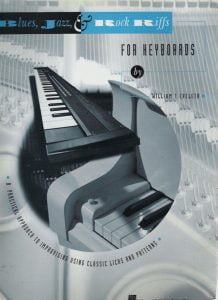 |
|
| William Gillock In Old Vienna Musescore File.mscz | ||
| William Gillock Valse Etude In Romantic Style Musescore File.mscz | ||
| William Joseph – Within (Songbook) (William Joseph) |
 |
William Joseph – Within (Songbook) (William Joseph) |
| William Robinson – My Girl | ||
| William Russo Composing Music A New Approach (ebook) |
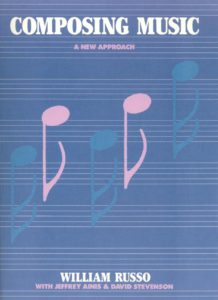 |
|
| Willie Dixon Preacher Of The Blues (2011) Mitsutoshi Inaba (Book) Biography |
 |
|
| Willie Fugal S Blues Piano transcription |
 |
|
| Willie Nelson – Always on My Mind Sheet Music |
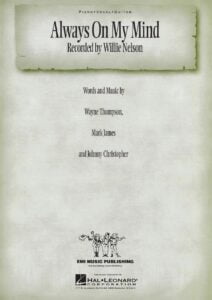 |
|
| Willie Nelson – On My Mind | ||
| Willie The Lion Smith – Finger Buster transcription |
 |
|
| Willie The Lion Smith Echo of Spring transcription |
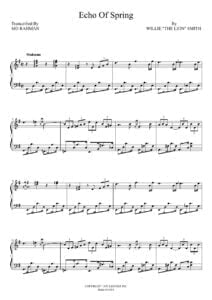 |
|
| Willow Weep For Me Words And Music By Ann Ronell 1932 Jazz Standard (Vintage sheet music) |
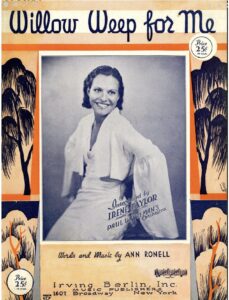 |
|
| Wim Mertens – American Minimal Music La Monte Young Terry Riley Steve Reich Philip Glass |
 |
Book La Monte Young Terry Riley Steve Reich Philip Glass |
| Wim Mertens – Close Cover | Wim Mertens – Close Cover | |
| Wim Mertens – Struggle For Pleasure | Wim Mertens – Struggle For Pleasure | |
| Wim Mertens – Time Passing |
 |
|
| Wim Mertens Humility |
 |
|
| Wim Mertens Lir |
 |
|
| Windham Hill piano sampler |
 |
Windham Hill piano sampler |
| Windy Whistle (Le Renard et l’Enfant OST) Alice Lewis | ||
| Wings (McCartney) – Greatest Hits |
 |
Wings sheet music |
| Winifred Atwell Album Of Rags No 1 Original arrangements Vintage songbook |
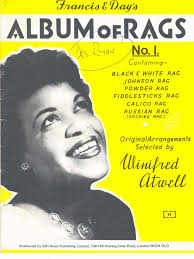 |
Winifred Atwell Album Of Rags No 1 Original arrangements Vintage songbook |
| Winifred Atwell Marguerite Monnot The Poor People Of Paris ( La Goualante Du Pauvre Jean) Piano Solo |
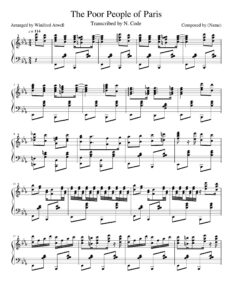 |
|
| Winnie The Pooh The Honey Tree Sheet Music (Disney) |
 |
Winnie The Pooh The Honey Tree Sheet Music (Disney) |
| Winter Sonata O.S.T. (Ryu) | ||
| Winter Wonderland Other Christmas Favorites Songbook Piano Vocal guitar Chords |
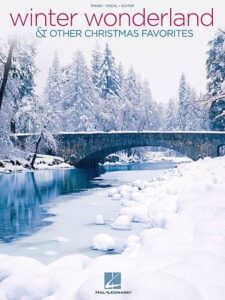 |
Winter Wonderland and Other Christmas Favorites Songbook Piano Vocal guitar Chords |
| Wish You Were Here – Pink Floyd (Musescore File).mscz | ||
| Within Temptation – Our Solemn Hour | ||
| Without you (Maria Carey) | ||
| Without You (Mariah Carey Piano Arr ) (Musescore File).mscz | ||
| Wiz Khalifa & Charlie Puth See You Again (Solo Piano) |
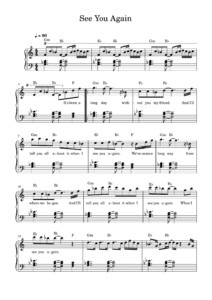 |
|
| Wolf Wagner Paraphrase Über Die Walküre |
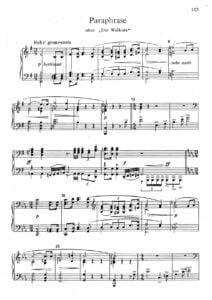 |
|
| Wolfe Richard Legit Professional Fake Book More Than 1010 Songs |
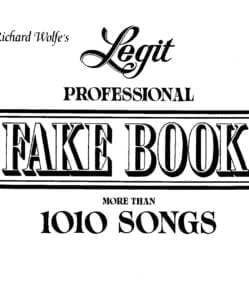 |
Wolfe Richard Legit Professional Fake Book More Than 1010 Songs |
| Wolfenzon – Stücke für Klavier | Wolfenzon – Stücke für Klavier | |
| Womack, Bobby – Midnight Mover My Autobiography The True Story of the Greatest Soul Singer in the World (Book) |
 |
|
| Woman in love (Barbra Streisand) | ||
| Women Of Pop Rock Songbook Twenty-Two Hot Hits for Easy Piano |
 |
Women Of Pop Rock Songbook Twenty-Two Hot Hits for Easy Piano |
| Wonderful Christmastime -Paul Mccartney (Wings) (Musescore File).mscz | ||
| Wonderful Life – Black (Easy Piano Solo Sheet Music) (Musescore File).mscz | ||
| Woody Allen – A propósito de nada (autobiografía)(2020) |
 |
|
| Woody Allen – Apropos of Nothing (2020) Autobiography | Woody Allen – Apropos of Nothing-Simon and Schuster (2020) Cover | |
| Woody Guthrie This Land Is Your Land (Easy and Intermediate Piano Solo) |
 |
|
| World Hits Of Jazz Standard |
 |
World Hits Of Jazz Standard |
| Wuthering Heights (Ryuichi Sakamoto) | ||
| Wynton Kelly – Autumn Leaves Solo transcription | Wynton Kelly – Autumn Leaves Solo transcription | |
| Wynton Kelly – Dark Eyes Solo Piano transcription |
 |
|
| Wynton Kelly – Dark Eyes Solo Piano Transcription (Musescore File).mscz | ||
| Wynton Kelly – Full transcriptions | Wynton Kelly – Full transcriptions | |
| Wynton Kelly – I Dig of You Solo transcription |
 |
|
| Wynton Kelly – If I should Love You Solo transcription |
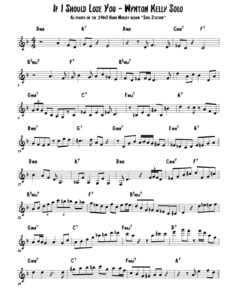 |
|
| Wynton Kelly – Jazz Piano Collection |
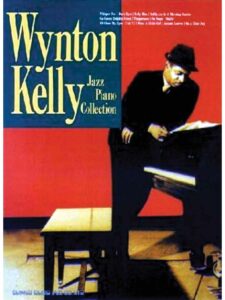 |
Wynton Kelly Piano Collection- |
| Wynton Kelly – Someday my prince will come (Piano solo) |
 |
|
| Wynton Marsalis Trumpet Genius Gourse, Leslie (Book) |
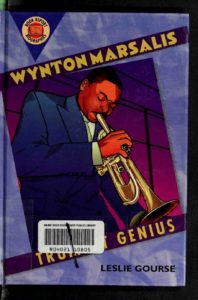 |
|
| Wynton Marsalis – Caravan (Solo) |
 |
|
| Wynton Marsalis – Darn That Dream (Solo) | Wynton Marsalis – Darn That Dream (Solo) | |
| Wynton Marsalis – Dealfayos Dillema (Solo) |
 |
|
| Wynton Marsalis – Standards (sheet music transcriptions) |
 |
Wynton Marsales – Standards (sheet music transcriptions) |
| Wynton Marsalis In The Court Of King Oliver (Trumpet and rhythm section) |
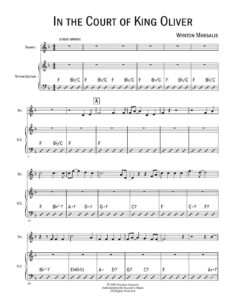 |
|
| Wynton Marsalis Omnibook For B Flat Instruments Transcribed exactly from his recorded solos |
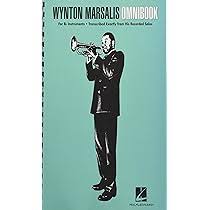 |
Wynton Marsalis Omnibook For B Flat Instruments Transcribed exactly from his recorded solos |
| Wynton Marsalis Struttin’ With Some Barbeque (Live) Wynton Marsalis’ Trumpet Solo |
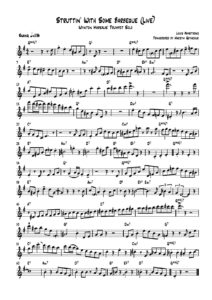 |
|
| Xenoblade Chronicles 2 Loneliness Kenji Hiramatsu | Xenoblade Chronicles Opening Theme Game sheet music | |
| Xenoblade Chronicles Opening Theme Game sheet music Yoko Shimomura |
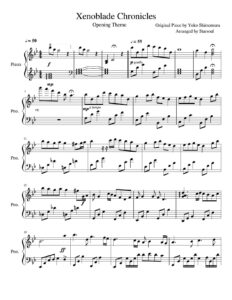 |
|
| Yamaha E443 Songbook digital keyboard PSR-E443 |
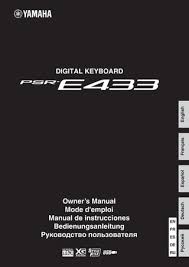 |
|
| Yamaha Keyboard Songbook |
 |
Yamaha Keyboard Songbook |
| Yamaha Keyboard Songbook Song-Buch |
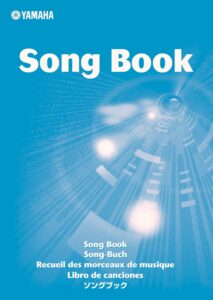 |
|
| Yamaha PSR E373 YPT-370 PSR-EW310 Song book |
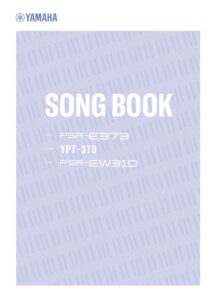 |
|
| Yamaha Song Book |
 |
Yamaha Song Book |
| Yamaha Song book |
 |
Yamaha Songbook |
| Yamaha Songbook |
 |
Yamaha-Songbook |
| Yamaha songbook 50 Piano Greats for the piano (Yamaha collection) |
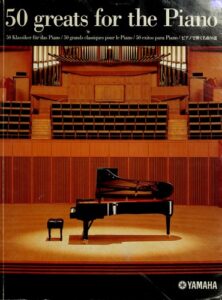 |
50 Piano Greats for the piano (Yamaha collection) |
| Yamaha Songbook Contemporary Vol. 1 |
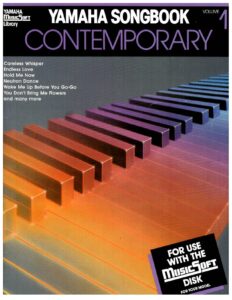 |
Yamaha Songbook Contemporary Vol. 1 |
| Yana Bobalik Mysterious Music Я.Бобалік Songbook |
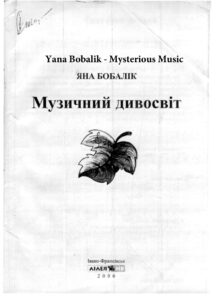 |
|
| Yana Bobalik Secret Music From Mysterious Music Я.Бобалік Таемна Музыка |
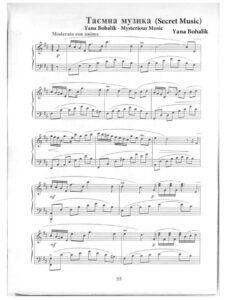 |
|
| Yann Tiersen Rue des Cascades (sheet music) | yann tiersen cascades sheet-music | |
| Yann Tiersen Mother’s Journey |
 |
|
| Yann Tiersen – Tabarly Sheet Music |
 |
|
| Yann Tiersen – Comptine Dun Autre ete | ||
| Yann Tiersen – La Dispute – Amelie Poulain | ||
| Yann Tiersen – La Valse d’Amelie Poulain | Yann Tiersen – La Valse Damelie | |
| Yann Tiersen – Le moulin – Amelie Poulain | Le Moulin – Amelie Poulain | |
| Yann Tiersen – Six pièces pour piano – Volume 2 – Amélie Poulain |
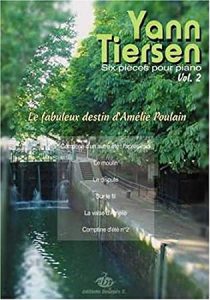 |
Yann Tiersen – Six pieces pour piano – Volume 2 – Music Sheet |
| Yann Tiersen – Summer 78 | ||
| Yann Tiersen – Sur Le Fil |
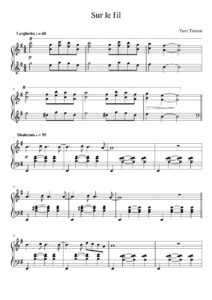 |
|
| Yann Tiersen – Pièces pour piano vol 1 et 2 + divers |
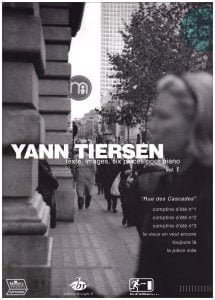 |
Yann Tiersen – pièces pour piano vol 1 et 2 + divers  |
| Yann Tiersen Eusa 2015 Songbook |
 |
|
| Yann Tiersen J’Y Suis Jamais Alle piano solo (Amélie) |
 |
|
| Yann Tiersen Onze Pièces Pour Piano |
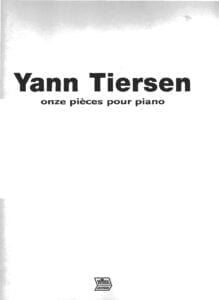 |
Yann Tiersen Onze Pièces Pour Piano |
| Yann Tiersen Partitions intégrales Piano Works 1993-2004 | Yann Tiersen Partitions intégrales Piano Works 1993-2004 | |
| Yann Tiersen Tabarly Complete Book For Piano |
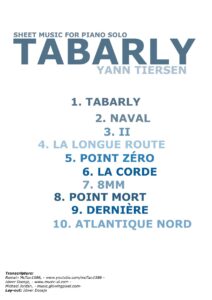 |
|
| Yanni In My Time (Piano Solos) Sheet Music |
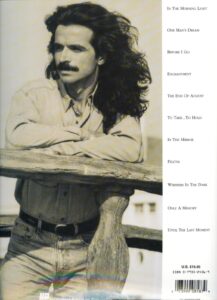 |
Yanni In my time piano solos |
| Yanni One Man’s Dream |
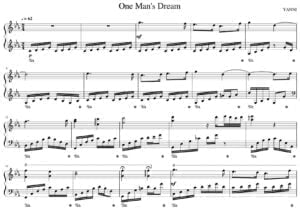 |
|
| Yanni – Per Piano (Piano book) |
 |
Yanni – Per Piano |
| Yanni – In The Morning Light | ||
| Yanni – Nostalgia | ||
| Yanni – One Man’s Dream (Musescore File).mscz | ||
| Yanni -The Best of |
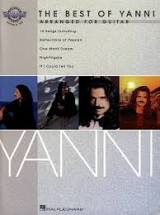 |
 |
| Yanni Ethnicity Book |
 |
Yanni Ethnicity Book |
| Yaron Herman – Hallelujah (Leonard Cohen) transcription |
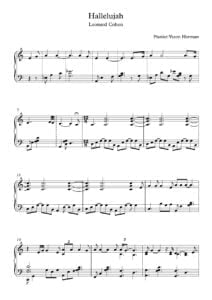 |
|
| Yashal (Elisa) | ||
| Yasuharu Takanashi – Naruto Shippuden OST – Loneliness |
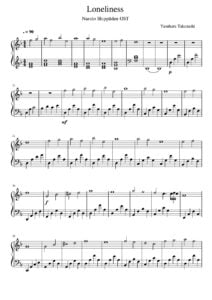 |
|
| Yedidia, Ronn Piano Sonata No 3 outcries (manuscrit) |
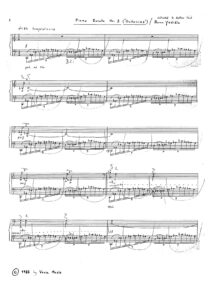 |
|
| Yehezkel Raz Ballerina Piano Solo sheet music |
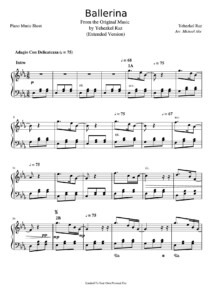 |
|
| YES Fragile |
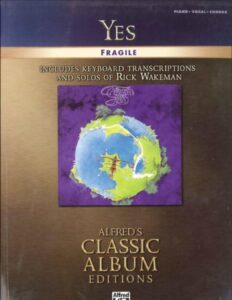 |
YES Fragile |
| YES – Complete Deluxe Edition |
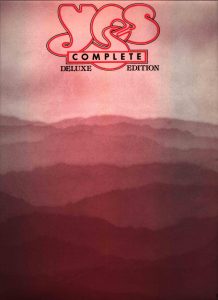 |
YES – Complete Deluxe Edition |
| Yes Close To The Edge The Story Of Yes (Book) |
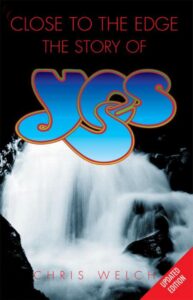 |
|
| Yes The Best Of Guitar Songbook with TABs |
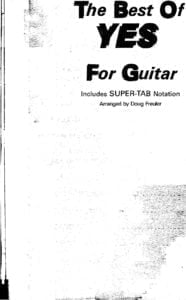 |
Yes The Best Of Guitar Songbook |
| Yesterday Piano Cello – Piano Sheet Music – Paul McCartney |
 |
|
| Yesterday Piano vocal guitar Songbook Featuring Music From the OST |
 |
|
| Yesterday The Beatles For Jazz Piano (Musescore File).mscz | ||
| Yesterday when I was young (Charles Aznavour) | ||
| Yimkin Law ( Et maintenant on va où OST) Racha Rizk | ||
| Yiruma – 27 May | ||
| Yiruma – Destiny Of Love | ||
| Yiruma – Dream | ||
| Yiruma – Dream A Little Dream Of Me | Yiruma – Dream A Little Dream Of Me | |
| Yiruma – Falling |
Lennie Tristano discography
Intuition (1946–52; Box 4 CD + Booklet 40 S.(en), compil. 2003 Proper/mcps)
Complete Recordings of Charlie Parker with Lennie Tristano (1947–51, ed. 2006)
Live at Birdland 1949 (Jazz Records 1979, 1990)
Live in New York (1949; with Lee Konitz, Warne Marsh, Billy Bauer u. a., compil. 2004 by Jazz Door)
Crosscurrents Capitol 1949 (als Album veröffentlicht erst 1972)
Descent into the Maelstrom, Inner City 1952
Lennie Tristano (Atlantic, 1956)
The New Tristano (Atlantic, 1961)
Concert in Copenhagen (aufgenommen 1965, Jazz Records 1997)
The Duo Sessions (Dot Time, ed. 2020)
Personal Recordings 1946-1970 (Mosaic/Dot Time, ed. 2021)Collection
The Complete Atlantic Recordings of Lennie Tristano, Lee Konitz & Warne Marsh (1955-58) – (Mosaic – 1997) – 10 LPs oder 6 CDs – Lennie Tristano p mit Lee Konitz, Gene Ramey, Art Taylor, Peter Ind, Jeff Morton dm –
Lee Konitz as mit Sal Mosca, Peter Ind, Dick Scott dm, Billy Bauer, Arnold Fishkind b, Jimmy Rowles, Leroy Vinnegar, Shelly Manne, Don Ferrara – Lee Konitz & Warne Marsh ts mit Sal Mosca, Billy Bauer, Oscar Pettiford, Kenny Clarke, Ronnie Ball p – Warne Marsh mit Ronnie Ball, Paul Chambers, Philly Joe Jones, Paul Motian